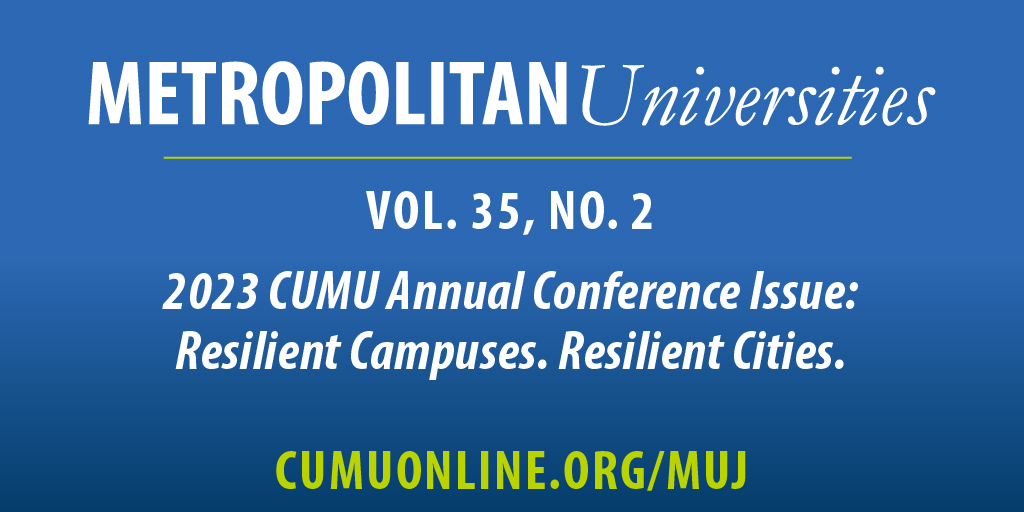Learning through Collaboration
Reflections on Cultivating Cross-Institutional Capacity for Place-Based Community Engagement
DOI:
https://doi.org/10.18060/27708Keywords:
U.S. higher education, place-based community engagement, cross-institutional capacity buildingAbstract
This article highlights the nascent efforts between College Unbound, Brown University, and Providence College—three very different types of institutions in Providence, Rhode Island—to foster cross-institutional capacity for place-based community engagement. By collectively engaging our institutions, we experimented with what collaboration around community engagement might look like within our local context. In this article, we share our approach and reflections in working to cultivate a place-based collaboration that centers community, along with limitations, lessons learned, and next steps. Through our efforts, we situate cross-institutional collaborations as an opportunity for more sustained, collaborative, and transformative work within higher education community engagement.
References
Boyte, H. C. (2009). Civic agency and the cult of the expert. Kettering Foundation. https://www.kettering.org/sites/default/files/product-downloads/Civic_Agency_Cult_Expert.pdf
brown, a. m. (2017). Emergent strategy: Shaping change, changing worlds. AK Press.
Dubb, S., McKinley, S., & Howard, T. (2013). The anchor dashboard: Aligning institutional practice to meet low-income community needs. The University of Maryland Democracy Collaborative. https://www.aecf.org/resources/the-anchor-dashboard-1/
Interfaith America. (Forthcoming). Bridgebuilding in higher education: A landscape analysis. Interfaith America.
Kretzman, J. P., & McKnight, J. L. (1993). Building communities from the inside out: A path toward finding and mobilizing a community’s assets. ACTA Publications.
Lane, P., & Leibrandt, S. (2021). Recognizing prior learning in the 21st Century: A synthesis brief. Western Interstate Commission for Higher Education. https://www.wiche.edu/key-initiatives/recognition-of-learning/synthesis-brief/#_edn1
Leiderman, S., Furco, A., Zapf, J., & Goss, M. (2003). Building partnerships with college campuses: Community perspectives. The Council of Independent Colleges. https://archives.huduser.gov/oup/conferences/presentations/hsiac/engaging_brochure.pdf
Longo, N. V. (2022). Does place still matter? The future of higher education depends on vibrant local communities. TIAA Institute. https://www.tiaa.org/public/institute/about/news/does-place-still-matter-future-higher-education-depends-vibrant-local-communities
Marullo, S., Moayedi, R., & Cooke, D. (2009). C. Wright Mills’s friendly critique of service learning and an innovative response: Cross institutional collaborations for community-based research. Teaching Sociology, 37(1), 61–75.
Medved, P., & Ursic, M. (2021). The benefits of university collaboration within university-community partnerships in Europe. Journal of Higher Education Outreach and Engagement, 25(2), 79–94.
Mileva, G., Lake, D., Carpenter, H., Lancaster, P., Carr, D., & Yarbrough, T. (2016). The engaged department initiative: GVSU, GRCC, and Aquinas join forces for place-based impact [Poster presentation]. Community Engagement and Research Symposia, Worcester, MA. https://doi.org/10.13028/c14n-5w88
Ngai, G., Shek, D. T. L., Yue, K., Xu, H., & Snell, R. S. (2019, January). Cross-institutional capacity building for service-learning in Hong Kong higher education institutions [Paper presentation]. International Conference on Service-Learning, Hong Kong, China.
Quan, M. (2023). A framework for justice-centered relationships: Implications for impact in place-based community engagement. Metropolitan Universities, 34(2), 138-157. https://doi.org/10.18060/26450
Sandy, M. (2007). Community voices: A California Campus Compact study on partnerships. California Campus Compact. http://www.cacampuscompact.org/html/publications/communityVoices.html
Scobey, D. (2023, March/April). The Paradigm Project: A call for radical renewal in higher education. Change: The Magazine of Higher Learning, 55(2), 14-19.
Shah, R. W. (2020). Rewriting partnerships: Community perspectives on community-based learning. Utah State University Press.
Stoecker, R. (2016). Liberating service learning and the rest of higher education civic engagement. Temple University Press.
Stoecker, R., Tryon, E., & Hilgendorf, A. (2009). Unheard voices: Community organizations and service Learning. Temple University Press.
Wallace, J. (2000). The problem of time: Enabling students to make long-term commitments to community-based learning. Michigan Journal of Community Service-Learning (7), 133-142.
White, B. P. (2012). Confronting the careless university. ejournal of Public Affairs, 1(2), 1-15. http://www.ejournalofpublicaffairs.org/1-2-confronting-the-careless-university/
White, B. P. (2021). Toward the community-centric university. Higher Education Exchange, 6-21.
Yamamura, E. K., & Koth, K. (2018). Place-based community engagement in higher education: A strategy to transform universities and communities. Stylus.
Downloads
Published
Issue
Section
License
Copyright (c) 2024 Carmine Perrotti, Nicholas V. Longo , Julie L. Plaut , Adam Bush

This work is licensed under a Creative Commons Attribution 4.0 International License.



